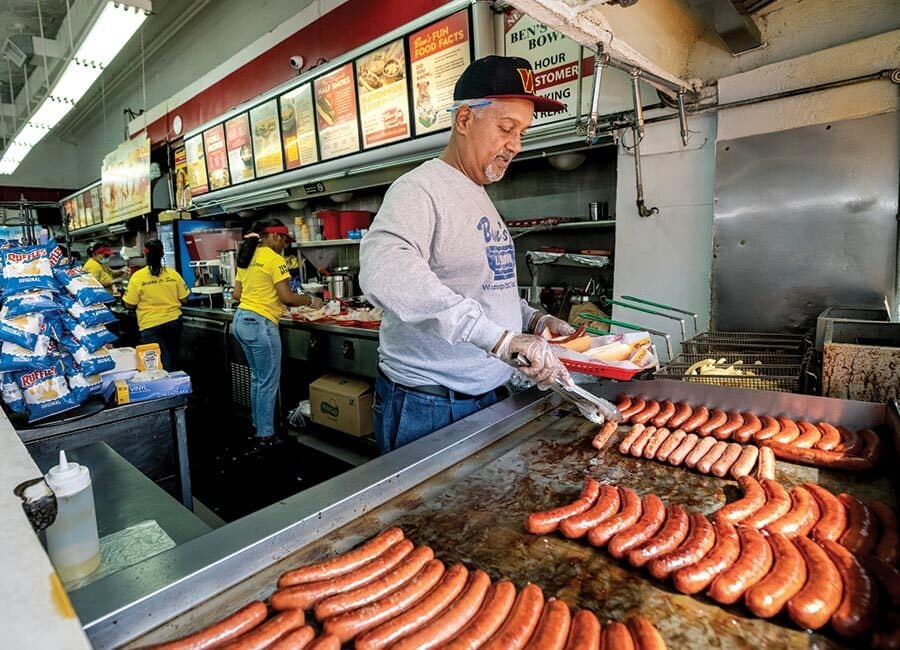
Kamal Ali, one of the co-owners of Ben’s Chili Bowl and son of founders Ben and Virginia, flips sausages on the grill.
Just a year after D.C. became the country’s first majority-Black big city, Trinidadian immigrant Ben Ali and his fiancée, Virginia, opened Ben’s Chili Bowl on bustling U Street in 1958, introducing to the community what was, by the standards of the time, a spicy concoction. Patrons included Martin Luther King Jr., who set up an office just down the street; jazz legends Ella Fitzgerald and Duke Ellington, who performed at clubs nearby; and students and faculty from historically Black Howard University, half a mile away.
This was near the end of U Street’s heyday as Black Broadway. Since the late 19th century, Jim Crow laws and segregation had pushed Black intellectuals, artists and entrepreneurs to develop separate areas where they could live and thrive. In that era, U Street’s Black-owned banks, shops and clubs were born.
D.C.’s robust Black population stemmed in part from Camp Barker, set up during the Civil War to hold enslaved people who were considered contraband from the South. When President Abraham Lincoln signed the Emancipation Proclamation in 1863, many of them chose to stay and forge a new life in D.C., building homes to create the beginnings of U Street. (To be sure, Black people have lived in what’s now D.C. since before the nation’s founding, and enslaved people helped build the White House, the Capitol and other iconic buildings that tourists flock to today.)
In the 1960s, African American civil rights activists gathered at Ben’s Chili Bowl. And when King was assassinated in April 1968, U Street fell victim to racial riots. Protesters burned down business after business, though they spared Ben’s, which went on to feed activists and first responders alike.
The area fell into disrepair after that, but through the decades, even as the crack cocaine epidemic spread and construction of the Metro’s Green Line blocked the street, Ben’s remained. The subway line opened, and luxury apartments and trendy restaurants started popping up—part of the gentrification of D.C., as the Black population shrank from more than 70% during its “Chocolate City” days to just 45% today. But Ben’s remained, and even expanded to Ben’s Next Door (yes, literally next door), offering a more upscale dining experience.
It was that “remarkable continuity” that prompted Woehlke and Collins to approach the Ali family. The concept of a food tour was so new in D.C. that the Blue Fern founders were initially turned down at other restaurants when they pitched their idea—but when Ben’s co-owner Nizam Ali (son of the founders) agreed to work with them, more doors opened.
“They do a really good job of telling this rich history,” Ali says. “We feel it’s our role, being this anchor here on U Street, to teach people about Black Broadway. D.C. isn’t about the federal buildings. It’s about the people, the culture, the music.”
That’s what Woehlke focuses on as he designs the tours, drawing on UMD sociology Distinguished University Professor Emerita Patricia Hill Collins’ lessons on intersectionality. He hopes that compelling storytelling will help guests find common threads with people who have different backgrounds and experiences.
Blue Fern’s approach has detractors; a handful of online reviewers dislike the history-focused approach, and a few prospective tour guides have turned down the gig over the “progressive” nature of the content.
That’s exactly the attitude he’s trying to change. “Animosity in society is connected to ignorance,” Woehlke says. As a white man, he knows he’s not the ideal person to tell stories about Black history. But he hopes that giving his mostly white customers an easy entrée into that past through food will inspire them to take a closer look at how similar issues—discrimination, immigration, gentrification—affect their own towns, and to seek out other Black- or immigrant-owned businesses back home too.
“We’re aiming for a broader impact than just having a nice afternoon and eating some good food,” he says.

